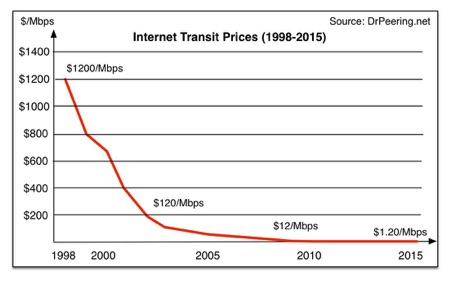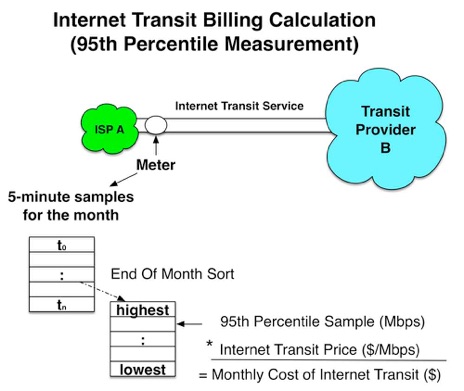Ask Dr. Peering




Q:
DrPeering -
We are buying Internet Transit and getting prices way higher than your graph shows:

Specifically we are paying $7/Mbps. Why the disparity?
Professor
Mary Ann
Ginger
Thurston Howell III
Gilligan
A:
Thanks for the note. Internet Transit pricing varies per market and varies based on competition and access proximity to peering points. For example, I met some ISPs in rural Texas that say they are paying AT&T towards $50/Mbps and there simply isn’t an alternative. In and around the Dallas Infomart one can purchase transit for closer to $2/Mbps.
I’ll share some Internet Transit definitions from The 2014 Internet Peering Playbook along with a couple of the tricks of the trade from the book.
The Internet Transit Pricing Model
Internet Transit is typically a metered service outside of the residential market. The unit price for Internet Transit services varies widely, but the service itself is typically priced on a per-megabit-per-second (Mbps) basis, metered using the 95th percentile traffic sampling technique.
Definition: The 95th Percentile Measurement Method (also called 95/5) identifies a single measurement (the 95th percentile 5-minute sample for the month) to determine the transit service volume for monthly transit fee calculation.
The 95th Percentile Measurement Method is typically a three-step process, as follows (diagrammed in Figure 2-3):
1.Every 5 minutes the meter on the service is sampled.
2.The delta is calculated between the two adjacent samples and the result is stored. (It is in this step that corrections are made for wrapped counters, counter resets from reboots, anomalies in the measurement on the metering device, etc.)
3.At the end of the month, the 5-minute deltas are converted into Mbps and stacked lowest to highest. It is the 95th percentile value that is used to calculate the traffic volume for the month.

Figure 2-3. Calculating the monthly cost of Internet Transit using the 95th percentile measurement methodology.
The basic Internet Transit billing model is simple:
Monthly Bill = Internet Transit Volume * Internet Transit Unit Price
Example:
If you signed an Internet Transit contract with a negotiated price of $5/Mbps (measured at the 95th percentile), and at the end of the month you sent 500Mbps (measured at the 95th percentile), what would be your transit cost that month?
Answer: 500Mbps * $5/Mbps = $2500 per month
Tricks of the Trade:
Short-Term Transit with Renegotiated Burst
One approach to minimizing the cost of Internet Transit service is to purchase transit from a number of ISPs, committing only the minimal volume and the shortest duration and negotiate pricing for the majority of your traffic that “bursts” over the commit level..
You may ask, “won’t you get a higher price point with a minimal commit?”
And the answer is “Yes” but you renegotiate the price at the price point at the end of the short contract term.
More importantly, this transit purchase strategy send a subset of the Internet Transit load to satisfy the commit levels to many ISPs, with the idea of sending the majority of traffic to those with the lowest “burst” price for the month. The next month, you give the ISPs a chance to compete on price for burst again, effectively allowing you to ride the transit price drop curve on a monthly basis as shown below.

In this strategy, you get the lowest possible price for the large amount of your traffic - the burst traffic. Pretty clever, huh?

How do network operators reduce their Internet Transit expenses?
Internet Transit Tricks
April 30, 2014

The 2014 Internet Peering Playbook
In Print
and for the Kindle:
The PDF, ePub and
.mobi files are
also available as a
perpetually updated
DropBox share:
Price: $9.99
and in French!
The 2013 Internet Peering Playbook
also available for the Kindle:
and the ipad





